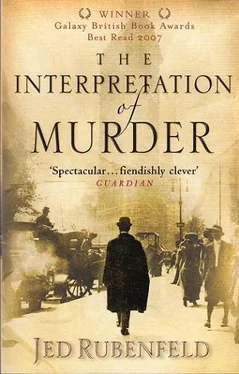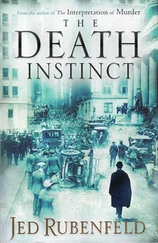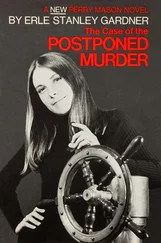Jed Rubenfeld - The Interpretation of Murder
Здесь есть возможность читать онлайн «Jed Rubenfeld - The Interpretation of Murder» весь текст электронной книги совершенно бесплатно (целиком полную версию без сокращений). В некоторых случаях можно слушать аудио, скачать через торрент в формате fb2 и присутствует краткое содержание. Жанр: Исторические приключения, на английском языке. Описание произведения, (предисловие) а так же отзывы посетителей доступны на портале библиотеки ЛибКат.
- Название:The Interpretation of Murder
- Автор:
- Жанр:
- Год:неизвестен
- ISBN:нет данных
- Рейтинг книги:5 / 5. Голосов: 1
-
Избранное:Добавить в избранное
- Отзывы:
-
Ваша оценка:
- 100
- 1
- 2
- 3
- 4
- 5
The Interpretation of Murder: краткое содержание, описание и аннотация
Предлагаем к чтению аннотацию, описание, краткое содержание или предисловие (зависит от того, что написал сам автор книги «The Interpretation of Murder»). Если вы не нашли необходимую информацию о книге — напишите в комментариях, мы постараемся отыскать её.
The Interpretation of Murder — читать онлайн бесплатно полную книгу (весь текст) целиком
Ниже представлен текст книги, разбитый по страницам. Система сохранения места последней прочитанной страницы, позволяет с удобством читать онлайн бесплатно книгу «The Interpretation of Murder», без необходимости каждый раз заново искать на чём Вы остановились. Поставьте закладку, и сможете в любой момент перейти на страницу, на которой закончили чтение.
Интервал:
Закладка:
'That's it, cousin. You're on your own.' Having come to the end of the corridor, I discharged Belva, or rather Aunt Mamie prised me from her, pairing me off instead with a Miss Hyde, who was plainly rich but had few other charms. I danced with several other misses as well, including the tall and balletic Eleanor Sears, who was quite amiable, although I was obliged constantly to duck her hat, which was shaped like a sombrero. And of course I took a turn with poor Belva.
After the requisite oyster cocktail, we were fed — according to the gilt-edged menu — a buffet russe, roast mountain sheep with chestnut puree and asparagus, champagne sherbet, diamondback Maryland terrapin, and ruddy duck with an orange salad. This was only the first of two suppers, the second to be served after midnight. After the second supper, the cotillion would get under way, with the formal dances — probably a Mirror, if I knew Aunt Mamie — starting around one-thirty in the morning.
I really didn't mind the occasional party in New York. I had stopped attending social functions in Boston, where I could not escape the whispers and sidelong glances owing to the circumstances of my father's death. The difference between Boston and New York society was this: the goal in Boston was to do nothing but what had always been done; in New York it was to outdo anything that had ever been done. But the sheer spectacle of a New York party — and one was of course supposed to be part of that spectacle — was a thing my Boston blood could never quite grow used to. The debutantes in particular, while far more plentiful than their Bostonian counterparts, and far better looking, were too sparkly for my taste. They were an efflorescence of diamond and pearl — on their corsages, around their necks, dangling from their ears, draped on their shoulders, nested in their hair — and though all these articles were doubtless genuine, I could not help the feeling that I was looking at paste.
'Here you are, Stratham!' cried Aunt Mamie. 'Oh, why must you be cousins with my Marion? I would have married you off to her years ago. Now listen to me. Miss Crosby is asking everyone who you are. She is eighteen this year, the second handsomest girl in New York, and you are still the single handsomest man — I mean the handsomest single man. You must dance with her.'
'I have danced with her,' I replied, 'and I have it on good authority that she means to marry Mr de Menocal.'
'But I don't want her to marry de Menocal,' answered Aunt Mamie. 'I wanted de Menocal to marry Franz and Ellie Sigel's granddaughter Elsie. She, however, has run away to Washington. It was my understanding that people ran away from Washington. What can the girl have been thinking? One might as well elope to the Congo. Have you said hello to Stuyvie yet?'
Stuyvie was, of course, her husband, Stuyvesant. As I had not yet exchanged greetings with Uncle Fish, Aunt Mamie conducted me toward him. He was engaged in close conversation with two men. Next to Uncle Fish, I recognized Louis J. de G. Milhau, whom I knew as a fellow undergraduate at Harvard. The other man, perhaps forty-five years old, looked familiar, but I couldn't place him. He had closely cropped dark hair, intelligent eyes, no beard, and an air of authority. Aunt Mamie solved my difficulty when she added, under her breath, 'The mayor. I shall introduce you.'
Mayor McClellan, it turned out, was just departing. Aunt Mamie cried out in protest, objecting that he would miss Caruso. Aunt Mamie detested opera, but she knew the rest of the world considered it the pinnacle of taste. McClellan apologized, thanking her cordially for her beneficence to the city of New York, and swore he would never leave at such an hour, were it not for a very serious matter demanding his immediate attention. Aunt Mamie objected even more strenuously, this time to the use of the term 'very serious matter' in her presence. She did not want to hear about any very serious matters, she said, fleeing us in a cloud of chiffon.
To my surprise, Milhau then said to the mayor, 'Younger here is a doctor. Why don't you tell him about it?'
'By gad,' exclaimed Uncle Fish, 'that's right. A Harvard doctor. Younger will know the man for the job. Tell him about it, McClellan.'
The mayor surveyed me, made some sort of internal decision, and put a question. 'Do you know Acton, Younger?'
'Lord Acton?' I responded.
'No, Harcourt Acton of Gramercy Park. It's about his daughter.'
Miss Acton had apparently been the victim of a brutal assault earlier this evening, in her family's house, while her parents were away. The criminal had not been apprehended, nor had he even been seen by anyone else. Mayor McClellan, who knew the family, desperately wanted from Miss Acton a description of the criminal, but the girl could neither speak nor even remember what had happened to her. The mayor was returning to police headquarters this instant; the girl was still there, attended by her family doctor, who had professed himself mystified by her condition. He could find no physical injuries capable of producing her symptoms.
'The girl is hysterical,' I said. 'She is suffering from crypto-amnesia.'
'Crypto-amnesia?' repeated Milhau.
'Loss of memory brought on by repression of a traumatic episode. The term was coined by Dr Freud of Vienna. The condition is essentially hysterical and can be found with aphonia — speech loss — as well.'
'By gad,' said Uncle Fish again. 'Speech loss, did you say? That's it!'
'Dr Freud,' I went on, 'has a book on speech dysfunction.' Freud's monograph on the aphasias was read in America long before his psychological writings became known. 'He is probably the world's leading authority on the subject and has specifically shown an association with hysterical trauma — especially sexual trauma.'
'Pity your Dr Freud is in Vienna,' said the mayor.
Chapter Five
I hammered on Brill's door until at last his wife, Rose, answered. I was bursting to tell them not only that I had arranged Freud's first American consultation but that a motorcar and driver were waiting downstairs to take him there, sent by the mayor of New York himself. The scene into which I intruded, however, was so full of good spirit and conviviality that I could not immediately see my way to breaking it up.
Brill's place was on the fifth floor of a six-story apartment house on Central Park West. And it was tiny — just three rooms, each smaller than my chamber at the Manhattan. But it looked out directly on the park, and nearly every inch of it was crammed with books. A homey smell of cooked onions hung in the air.
Jung was there, as well as Brill, Ferenczi, and Freud, all crowded around a small dining table in the middle of the main room, which served as kitchen, dining area, and parlor all at once. Brill shouted out that I must sit down and have some of Rose's brisket; wine was poured for me before I could reply. Brill and Ferenczi were in the middle of a story about being analyzed by Freud, with Brill acting the part of the Master. Everyone was laughing, even Jung, whose eyes, I noticed, lingered on Brill's wife.
'But come, my friends,' said Freud, 'that does not answer the question: why America?'
'The question, Younger,' Brill clarified for my benefit, 'is this. Psychoanalysis is excommunicated everywhere in Europe. Yet here, in puritanical America, Freud is to receive his first honorary degree and is asked to lecture at a prestigious university. How can that be?'
'Jung says,' Ferenczi added, 'it is because you Americans don't understand Freud's sexual theories. Once you do, he says, you will drop psychoanalysis like hot apple.'
'I don't think so,' I said. 'I think it will spread like wildfire.'
'Why?' asked Jung.
'Precisely because of our puritanism,' I answered. 'But there is something I — '
Читать дальшеИнтервал:
Закладка:
Похожие книги на «The Interpretation of Murder»
Представляем Вашему вниманию похожие книги на «The Interpretation of Murder» списком для выбора. Мы отобрали схожую по названию и смыслу литературу в надежде предоставить читателям больше вариантов отыскать новые, интересные, ещё непрочитанные произведения.
Обсуждение, отзывы о книге «The Interpretation of Murder» и просто собственные мнения читателей. Оставьте ваши комментарии, напишите, что Вы думаете о произведении, его смысле или главных героях. Укажите что конкретно понравилось, а что нет, и почему Вы так считаете.












